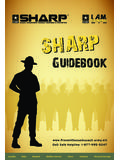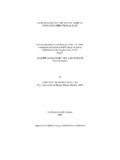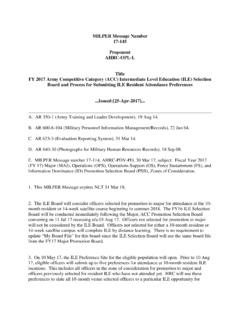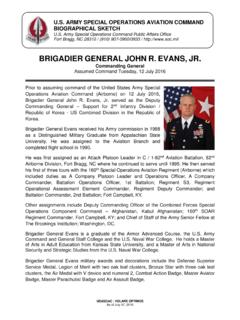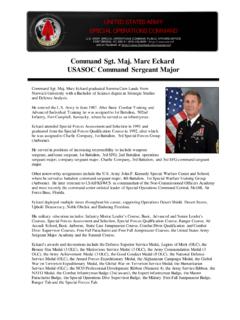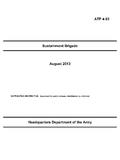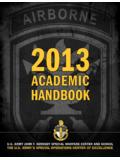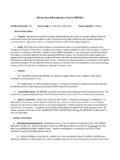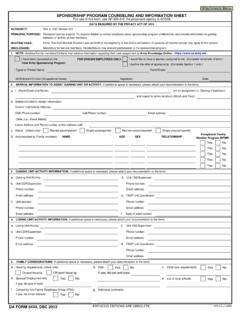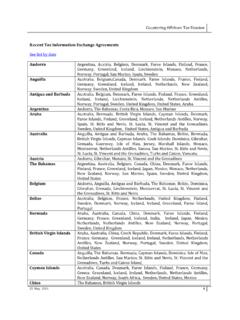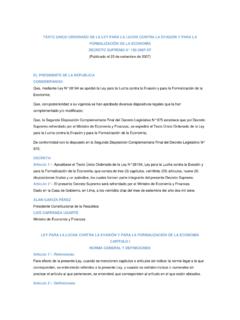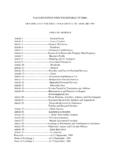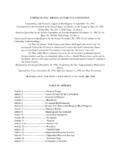Transcription of Survival, Evasion Resistance and Escape (SERE) …
1 survival , Evasion Resistance and Escape (SERE) Course (PHASE II SFQC). (19 DAYS). ATRRS SCHOOL CODE 331. COURSE CODE: 3A-F38/12-F27. PURPOSE: To train selected personnel on Code of Conduct, survival , Evasion , Resistance and Escape . This SERE Course is only for personnel holding an ARSOF MOS as per USAJFKSWC command policy. Exceptions must be predetermined by the Commanding General, USAJFKSWCS or his designated representative. Level C training is for soldiers whose position, MOS, or assignment has a high risk of capture and whose position, rank, or seniority makes them vulnerable to greater than average exploitation efforts by a captor in both wartime and peacetime environments.
2 Wartime examples include personnel who operate forward of the FLOT such as Special Forces, pathfinders, selected aviators, flying crewmembers, and members of Ranger battalions. Peacetime examples include personnel who have a high risk of being taken hostage by terrorists or being detained by a hostile government in a peacetime environment. Examples include Special Forces, selected military attaches, members of Ranger battalions, and anyone in special support missions near conflict areas. SCOPE: CODE OF CONDUCT APPLICATIONS IN WARTIME, PEACETIME, GOVERNMENTAL AND/OR HOSTAGE.
3 DETENTION ENVIRONMENTS. GENERAL survival SKILLS. Evasion PLANNING. Resistance TO EXPLOITATION & POLITICAL INDOCTRINATION. Escape PLANNING. PRODUCT PRODUCED: Personnel are intensively trained in support of the Code of Conduct; survival field craft with application to worldwide environments; and the techniques of Evasion , Resistance to exploitation, and Escape from captivity. COURSE PREREQUISITES: Active and Reserve component personnel of the armed forces of the United States specified by DOD Directive and AR 350-30 to receive Level C Code of Conduct/SERE. training.
4 REPORTING INSTRUCTIONS: Because some students will be coming from distant stations (TDY. Students), and other students are already stationed at Fort Bragg (local students), some of the following will not apply equally. 1. Students must have all their affairs in order prior to in-processing. No time will be available to return leased vehicles or perform other non-course activities after reporting for in processing. 2. TDY students arriving at Fort Bragg should register at Moon Hall NLT Sunday evening, the day before the course start date. Moon Hall is located in building D-3601; telephone: DSN 236-7700 or Commercial (910) 396-7700.
5 Moon Hall is for billeting only. Course cadre will NOT be present at check-in. 3. TDY students must provide a copy of orders to the Moon Hall Receptionist at check-in. In order to expedite checkout, management suggests paying all expenses the night before checkout to avoid checkout lines. Those students who settle their accounts the night before check-out should inquire, at that time, about express check-out for course students. 4. TDY students staying overnight at Moon Hall should be checked out of Moon Hall prior to 0630. hours Monday morning. Schedule a reservation for the 19th and 20th day of class.
6 1st day of class is Monday unless otherwise specified. TDY personnel must make their own reservations at Moon Hall for any overnight stays required at the completion of the course. If no rooms are available at Moon Hall at the end of the course, a statement of non-availability will be issued. 5. All students report, with their gear, outside in front of USAJFKSWCS Bank Hall, center ramp, Building D-3915, on Monday morning NLT 0600 to be transported to Camp Mackall for in-processing. The USAJFKSWCS Bank Hall, Building D-3915 is bordered by Zabitosky Road, Ardennes Street, Merrill Street, and Bastogne Drive.
7 6. No transportation will be provided from Moon Hall to Bank Hall, Building D-3915. Students will bring all bags to in-processing. You will board military transportation immediately upon its arrival, and there will be no time to return to Moon Hall to pick up your gear. 7. TDY students who complete training should not plan to travel before Saturday. 8. No mail will be issued or received during the course and no phone calls will be authorized. 9. All students will report with the following: Failure to report with the prerequisite items will result in failure to attend the SERE course.
8 A. ID card and ID tags. b. Orders (five copies). TDY students will have DD Form 1610 or Format 400/440 TDY orders. Local students will have Format 440 attachment orders (memorandum format). Government quarters are provided and field conditions apply. Students will have access to the dining facility. c. Service members will hand carry their SERE physical, current within 2 years with the U. S. Army John F. Kennedy Special Warfare Center and School (USAJFKSWCS) or U. S. Army Special Operations Command (USASOC) surgeon approved SERE stamp, for the purpose of attending SERE School.
9 Photocopied SERE physical will be accepted if the local TMC will not release the original physical. Soldiers assigned to USASOC Units may obtain the SERE physical stamp through their unit medical officer. Soldiers assigned to non-USASOC units whose groups do not possess the stamp must submit their physicals to the 1st SWTG(A) S-3 MED NCO for approval NLT 45 days prior to start date. **NOTE: The physical that was acceptable for SFAS/SFQC will suffice for SFQC students attending the SERE phase of training, providing the physical is current within a 2 year period.
10 In addition, the student must possess a normal EKG and a satisfactory urinalysis test within five years. Any abnormalities will have accompanying evaluation/waiver paperwork by appropriate medical specialist. Organization/unit surgeons will base their determinations of a soldier's medical qualification/disqualification on AR 40-501, Standards of Medical Fitness (12 APR 04). Soldiers requesting waivers for disqualifying medical conditions will submit their entire physical examinations along with a memorandum signed by the soldier requesting the medical waiver (NLT 30.)
